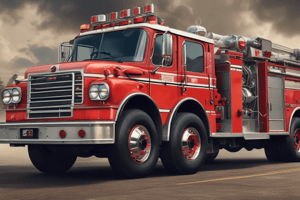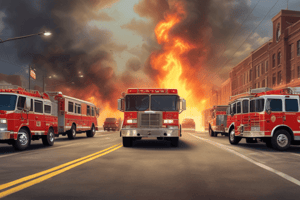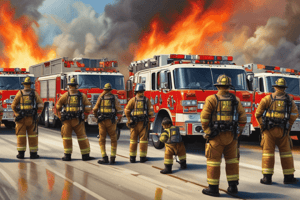Podcast
Questions and Answers
What is the primary function of the main disconnect in an elevator system?
What is the primary function of the main disconnect in an elevator system?
- To control the speed of the elevator
- To lock the hall doors when the elevator is not at the floor
- To deliver oil to the hydraulic jack
- To de-energize or remove power from the elevator (correct)
Which component is responsible for lowering a hydraulic elevator during a rescue situation?
Which component is responsible for lowering a hydraulic elevator during a rescue situation?
- Manual lowering valve (correct)
- Lift rod
- Knox box
- Interlock mechanism
What does the oil line in a hydraulic elevator system deliver?
What does the oil line in a hydraulic elevator system deliver?
- Power to the elevator motor
- Oil from the reservoir tank to the jack (correct)
- Electric signals to the control panel
- Hydraulic pressure to the pick-up rollers
Which component connects the pick-up rollers to the latch keeper on a hall door?
Which component connects the pick-up rollers to the latch keeper on a hall door?
What role does the valve in the elevator mechanical room serve?
What role does the valve in the elevator mechanical room serve?
What is the function of the Door Restrictor in an elevator?
What is the function of the Door Restrictor in an elevator?
Where is the Fire Service Phase II Switch located?
Where is the Fire Service Phase II Switch located?
Which component of an elevator allows for manual lowering of a hydraulic elevator during a rescue?
Which component of an elevator allows for manual lowering of a hydraulic elevator during a rescue?
What is the purpose of the Hoistway Access Key?
What is the purpose of the Hoistway Access Key?
What does the Car Station (C.O.P.) contain?
What does the Car Station (C.O.P.) contain?
What is the role of the Elevator Mechanical Room?
What is the role of the Elevator Mechanical Room?
What does the Door Operator control?
What does the Door Operator control?
How is the Flag (lift rod) functionally important in an elevator system?
How is the Flag (lift rod) functionally important in an elevator system?
What is the role of a lift rod?
What is the role of a lift rod?
What role does the interlock play?
What role does the interlock play?
___ ___- located on the hall door, this connectes the pick up rollers to the latch ____
___ ___- located on the hall door, this connectes the pick up rollers to the latch ____
_____- located on the hall doors these are what the car door clutch catches on to unlock and open the hall doors when the elevator stops at the floor
_____- located on the hall doors these are what the car door clutch catches on to unlock and open the hall doors when the elevator stops at the floor
____- part of every hall door, this keeps the hall doors locked when the elevator is not at the floor
____- part of every hall door, this keeps the hall doors locked when the elevator is not at the floor
Flashcards
Water Tender
Water Tender
A ground vehicle used for transporting large amounts of water used primarily for firefighting efforts.
Buffer Springs
Buffer Springs
Springs in the elevator pit that cushion the fall of a hydraulic elevator when manually lowered to the bottom floor.
Car Station (C.O.P.)
Car Station (C.O.P.)
The area inside the elevator that contains buttons and key switches for operating the elevator.
Door Restrictor
Door Restrictor
Signup and view all the flashcards
Car Door Clutch
Car Door Clutch
Signup and view all the flashcards
Door Operator
Door Operator
Signup and view all the flashcards
Fire Service Phase I Switch
Fire Service Phase I Switch
Signup and view all the flashcards
Fire Service Phase II Switch
Fire Service Phase II Switch
Signup and view all the flashcards
Flag (lift rod)
Flag (lift rod)
Signup and view all the flashcards
Hall Station
Hall Station
Signup and view all the flashcards
Interlock
Interlock
Signup and view all the flashcards
Knox Box
Knox Box
Signup and view all the flashcards
Lift Rod
Lift Rod
Signup and view all the flashcards
Main Disconnect
Main Disconnect
Signup and view all the flashcards
Manual Lowering Valve
Manual Lowering Valve
Signup and view all the flashcards
Study Notes
Emergency Operating Guidelines (EOG) Glossary
- Unit: Responsible organizational element for incident-specific Planning, Logistic, or Finance activities.
- Water Tender: Ground vehicle designed to transport specified quantities of water.
Elevator Definitions
- Buffer Springs: Springs in the elevator pit that stop a hydraulic elevator when manually lowered to the bottom floor.
- Car Station (C.O.P.): Inside the elevator, it contains buttons and key switches for operation.
- Car Top Emergency Exit: Rescue option for hydraulic or traction elevators when stuck between floors, located on top of the car.
- Car Door Clutch: Coupling device that connects car and hall doors when the car is level with the floor.
- Door Operator: Mechanism located on top of the car that opens and closes the elevator doors.
- Door Restrictor: Prevents car doors from opening when the elevator is between floors, often a collapsible bar on the car door clutch.
- Elevator Mechanical Room: Houses machinery for elevator movement and the main disconnect switch.
- Fire Service Phase I Switch: A three-position switch (On, Off, Bypass) located in the elevator lobby to operate elevators during Phase I fire service.
- Fire Service Phase II Switch: A three-position switch (On, Off, Hold) used with car station buttons for Phase II fire service operations.
- Flag (lift rod): A component that allows the hoistway access key to unlock the hall doors.
- Hall Station: Controls for the elevator, including hall push buttons or keyed switches located outside the elevator.
- Hoistway Access Key: Tool for unlocking hall doors to assist trapped passengers.
Additional EOG Glossary Terms
- Interlock: Security feature that keeps hall doors locked when the elevator is not at the floor.
- Knox Box: Container at the main egress floor that holds the elevator fire service control key.
- Lift Rod: Connects the pick-up rollers to the latch keeper on the hall door.
- Main Disconnect: Switch in the elevator mechanical room that removes power from the elevator.
- Manual Lowering Valve: Used to lower hydraulic elevators during rescue operations, found on the main valve.
- Oil Line: Delivers oil from the reservoir to the jack in hydraulic elevators.
- Pick Up Rollers: Components on hall doors that the car door clutch engages to unlock and open hall doors at the floor.
- Valve (main): Regulates oil flow in hydraulic elevators and controls speed; contains the manual lowering valve.
Studying That Suits You
Use AI to generate personalized quizzes and flashcards to suit your learning preferences.



